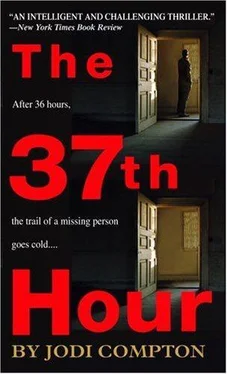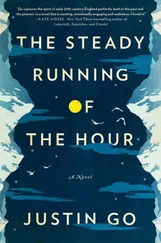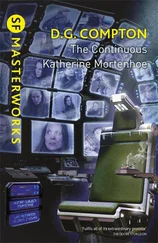“I ain’t seen nothing in the neighborhood, except the usual.” Darryl leaned against the doorjamb. “Your man? I see him running all the time. I don’t even think about it anymore, so I can’t remember the last time.” He shrugged. “Now that you mention it, I ain’t seen him running in about a week.”
“Okay,” I said. “Will you ask your wife and Tamara if they saw anything, and if they did, will you come over and let me know?”
“Yeah, all right.” He half closed the screen door, then he said, “I didn’t know you two was married.”
“We got married two months ago,” I said.
“Huh,” he said. “Look, if I think of anything else I’ll let you know. Really.”
“I appreciate it,” I said.
The rest of the interviews with our immediate neighbors were as unfruitful. No one could remember specifics, except that they’d seen him running from time to time, and no one had seen him running in the past few days.
I showed the photograph around: to more neighbors, at businesses near our home, to kids on bikes, to adults walking home from work. “He looks familiar,” a few people said, peering at the photo. But no one could remember having seen him specifically on Saturday or Sunday.
Ibrahim lifted a hand in greeting when I pushed open the swinging door to the Conoco. I waited for him to finish with a customer before I told him what I needed.
Ibrahim nodded, eyes narrowing. “Mike was in here a few days ago. Maybe more than a few.” Ibrahim’s English was perfect. Only his accent gave away his childhood home, Alexandria.
“Was it before last Sunday?” I asked.
He rubbed his balding head in thought.
“Try to remember something else that happened the same day, to set it apart,” I suggested.
Recognition sparked in his eyes. “The fuel delivery was late that day. So it was Saturday.”
“Did Shiloh come in before or after the delivery?” I asked.
“Oh, before,” he said. “Maybe noon, one o’clock. I remember it now. He bought two sandwiches, an apple, and a bottle of water.”
“Did he say anything that stands out to you?”
Ibrahim shook his head. “He asked how I was, I asked after him. That’s all.”
“When you asked him how he was, what did he say?”
Ibrahim frowned. “I’m sorry, I don’t remember.”
“That means he said he was fine, thanks,” I said sourly.
Ibrahim smiled. “You’re a clever woman, Sarah.”
“Not lately,” I said.
When I got in, the message machine light flashed in a single on-and-off pattern. One message.
“Sarah, Ainsley Carter wants you to call her when you get a chance,” Vang’s recorded voice said. “It’s an outstate number that she gave me, looks like she’s back in Bemidji…”
I picked up a pen and quickly copied down the number that he recited.
Ainsley picked up the phone on the fourth ring. “Oh, hi, thank you for calling, Detective Pribek,” she said.
“How’s Ellie?” I asked.
“Much better, it seems,” she said, and I could tell from the lightness of her voice that she wasn’t just trying to put a bright face on things. She sounded genuinely relieved. “The doctors at the crisis unit let her come home with us yesterday. Joe and I said we’d let her stay with us, and the psychiatric evaluation suggested she’d do okay under family supervision. And we’re finding her a therapist in town.”
“That’s good,” I said. “What do you need from me?”
“Nothing,” Ainsley said immediately. “I just wanted to thank you. What you did that day… I was too upset to realize it at the time, but what you did was extraordinary.”
My leap into the river, the minor notoriety around the department it caused, my embarrassment… these seemed like events from a year ago.
“I’m just glad Ellie is getting better,” I said.
“She’s on her way,” Ainsley said. “I really believe that she is. Detective Pribek?”
“I’m here,” I said.
“When I tried to call you at your work number, your partner said you were on leave, and then he wouldn’t say why.”
“Well, I am on leave,” I said.
“It wasn’t because of Ellie, was it?”
“Of course not,” I said. “Why would-”
“What you did was so extreme, I thought maybe you violated procedure and they put you on administrative leave because of it.” Ainsley laughed a little. “At least, that’s what I was afraid of.”
“No, nothing like that,” I said. “This is personal leave, not administrative.”
“Oh, good. Well, I’m glad I got to talk to you. I just felt you should know what happened to Ellie, after what you did for her. You know, to give you a feeling of closure.”
“Thank you,” I said. It was true: on the job you deal with a lot of individuals who aren’t criminals, just people with problems, under pressure they can’t handle. You deliver a lot of people to crisis units for observation, and make referrals to domestic-abuse hotlines and sexual-assault counseling services, and then you never know what happens after that. “A lot of times I don’t get that, you know, closure,” I told her.
After we hung up, I tried to let the good news about Ellie lighten my mood. I felt nothing and instead drifted toward the television, thinking of the evening news, and turned on the TV in the middle of a news story I vaguely remembered from radio broadcasts in the morning.
Early Sunday the highway patrol had been called to investigate a Ford pickup wrapped around a tree outside Blue Earth, the apparent result of an unwitnessed single-vehicle crash. The owner, a man in his sixties, was nowhere to be found and the theory now was that he’d walked away from the wreck disoriented and gone off into the countryside. The story didn’t really merit the time KSTP gave it, being set so far out of the Cities, but the visuals were good: a state police helicopter circling over the skinny trees of autumn, a tracking dog eager on its leash. KSTP showed earlier footage of the truck being towed off. The front-end damage was nasty, but otherwise the truck looked solid and powerful, well maintained in life, its paint still gleaming black where it wasn’t marred by the crash.
KSTP cut to world news and the phone shrilled in the kitchen.
“Is this Sarah Shiloh?” It was a male voice I didn’t recognize, using a name I barely thought of as my own.
“Speaking.”
“This is Frank Rossella, down at the medical examiner’s office? I’m sorry I didn’t get in touch with you during business hours.”
“What is it?” I said.
“There’s a John Doe down here. We think you should take a look at him.”
On my way out to the car, my little speech to Ainsley Carter came back to me: A lot of times you don’t get closure.
As I slid behind the wheel, ready to drive to the medical examiner’s building, a voice in my mind said, Here’s the closure you wanted, Sarah, here’s your closure, here’s your closure…
I drowned it out with the noise of the Nova’s engine.
Even when they aren’t specifically assigned to Homicide, most cops get more opportunities than they would prefer to go to the morgue. Sometimes I went alone with a photograph in my hand. Other times I went with a relative of a missing person, to walk them through the identification procedure.
But I hadn’t been down in a while, and I hadn’t met forensic assistant Frank Rossella, who was new. The flat a’s in his accent suggested he’d come from Boston or New York.
He was perhaps five-foot-seven and in his thirties, his brown hair in a low pompadour. For a shorter guy, he walked quickly. I had to lengthen my stride to keep pace as we went down a hallway lined with stainless-steel doors, temporary housing for the dead.
Читать дальше












